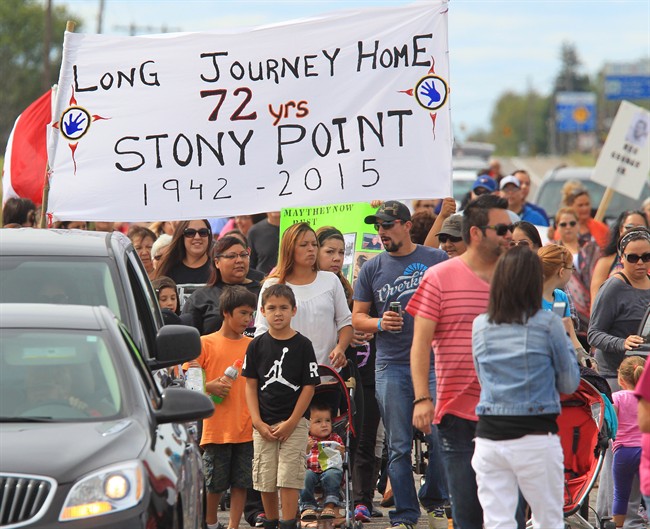This year’s Labour Day weekend marks the 25th anniversary of the Ipperwash Crisis and the police shooting death of Dudley George.

Though the dispute over Indigenous land took place in 1995, Grand Chief Joel Abram with the Association of Iroquois and Allied Indians (AIAI) says the community is still mourning to this day.
“It’s something that’s still fresh in many people’s minds today, especially for people in this region of Ontario.”
On the evening of Sept. 4, 1995, a group of demonstrators from Kettle and Stony Point First Nation protested against the ongoing occupation of Stony Point land.
The federal government offered $15 per acre in 1942 to reserve the land during World War II to use as a base for military training.
The government promised to return the land to the First Nations after the war was over, but never did.
The clash at Ipperwash in autumn 1995 resulted in the death of Anthony “Dudley” George, an Ojibwa protester who was shot dead by an Ontario Provincial Police (OPP) officer.
“That’s what it was about — the Stony Point people reclaiming the land that was theirs that was never actually returned to them but it was suppose to be,” said Abram with the AIAI.
“We hope this will prove that our claims and teachings need to be taken seriously and heard. We will stand up for ourselves and our ancestors and we will stand up for what’s right,” Abram added.
In the 2001 book One Dead Indian: The Premier, the Police, and the Ipperwash Crisis, investigative journalist Peter Edwards shared his experience with reporting the events as it unravelled.
Edwards said the starting point for him to write a book was Clifford George, a Stony Pointer who fought overseas.
“He thought he was going home and he had his military uniform on. He wasn’t allowed back to where his home was, because it was now a military base.”
“(This) Canadian war veteran, who was a Stony Pointer, was not allowed onto Stony Point land because the government had yet to return it. (That) was my starting point,” Edwards explained.
The tragedies of September 1995 still live fresh in his mind.

Get daily National news
The author says he remembers a massive police build-up, and throughout the day, police officers would carry military submachine guns.
“There had been a meeting of some cabinet-level people at Queen’s Park, and right after the meeting, all of a sudden, police were coming down to the park,” Edwards recounted.
The premier at the time, Mike Harris and other government officials had met to discuss the Ipperwash protest. The meeting notes concluded that the province will “remove the occupiers as soon as possible.”
On the night of Sept. 6, 1995, an unarmed Dudley George was shot by OPP acting sergeant Ken Deane.
George died in the early hours of Sept. 7th. He was 38 years old.
Edwards says George’s death wasn’t the only violence during the Ipperwash Crisis.
“There was another guy, Cecil Bernard George, his nickname is Slippery, who was beaten until his heart stopped.”
He was revived.
“It didn’t seem real, but shots were fired at the protestors,” Edwards recounted.
The author also recounted meeting Sam George, one of the brothers of Dudley George after the shooting.
“I met his brother really early in the morning, probably around 5 a.m. at Kettle Stony Point, and he showed up with a stack of pictures. He had just seen his brother’s body and he was in shock.”
“I said ‘who do you blame?’ and he said ‘I’m not blaming anyone, I need to know the truth.'”

Edwards says he gives credit to Sam George for his dedication in chasing after the truth of what happened to his brother.
“This didn’t happen through good will and guilt, this happened because Sam George wouldn’t go away and wouldn’t stop asking questions.”
Another memory Edwards says he can’t stop thinking about involves a future police officer in the George family.
“Right after the shooting, there was a meeting of the George family where one of Dudley George’s nephews had wanted to join the OPP, and (whether) he (should still) join after what happened.”
“Sam George and the rest of the family decided he should join because they need more First Nations people in the ranks,” said Edwards.
In December 2007, the Ontario government announced it would return the 56-hectare Ipperwash Provincial Park to the Chippewas of Kettle and Stony Point First Nation.
The settlement was finalized on April 14, 2016, along with a $95 million payment.
Twenty five years after the Ipperwash Crisis, Grand Chief Joel Abram with the AIAI says he does not believe there has been much progress in police’s handling of similar situations.
“We have some changes with how OPP deal with these types of situations, but at the end of the day, these (kinds) of situations are going to keep happening, because we haven’t attacked the root of the problem.”
“The root of the problem is refusal to acknowledge Indigenous people’s rights to the land, and the colonialism that’s happened.”

But Abram is feeling positive that future generations will have more opportunities to learn more about Indigenous cultures and rights.
“I think the tide is turning in terms of people being educated. A lot of this information has been suppressed, and people aren’t generally being taught this in schools.”
“We have to begin to acknowledge that Canada’s legal claim to the land is built on a house of cards, and when they see what the house of cards is constructed of, then that allows people to become enlightened, and see what the real issues are.”
Locally in London, Museum London is planning to host an exhibition to mark the 25th anniversary of the Ipperwash Crisis.
Gaawiin Ogiibaagininaawaasiin, which roughly translates from Anishinaabemowin to “they did not let it go,” brings together artwork by Anishinaabe artist Robert Houle, as well as maps, interview testimony, and photography to frame the events at Ipperwash.
The exhibition will be on display from Sept. 12, 2020 to Jan. 24, 2021.
–With files from 980 CFPL’s Jess Brady and Mike Stubbs













Comments